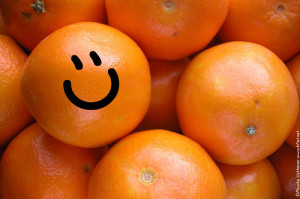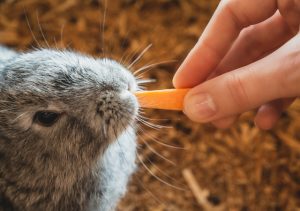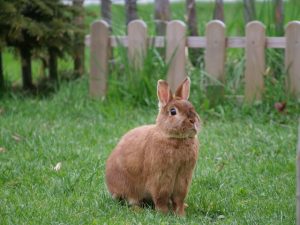
Do rabbits eat oranges? An orange fruit naturally has a lot of great health benefits in it. For starters, it contains no saturated cholesterol or fats and is low in calories. It contains a high amount of fiber called pectin. Pectin is a strong laxative that helps eliminate the content of the colon immediately. The result is a short exposure time of this organ to toxic substances that can cause serious disease. Moreover, pectin reduces blood cholesterol level by preventing its reabsorption.
As generally known by many, an orange fruit also contains a high dosage of Vitamin C. This vitamin is a natural antioxidant that provides resistance of the infectious, harmful and pro-inflammatory free radicals. It also has Vitamin A that helps maintain good eyesight. In addition, it contains another important mineral such as potassium that regulates heart rate and blood pressure and calcium that is important for having strong bones.
Can I Give My Rabbit Oranges?
Yes, but only as a treat.
More often than not, your rabbit would love it if you offer oranges to them. If you give them a piece, they would often play around with it first before eating it up. If you want to keep your rabbit healthy, restrict it to having less than ¼ of the fruit. Giving it once a week is enough for your rabbit to enjoy a varied meal. Doing so will provide additional nutrients and protection to your rabbit. It can also prevent hairballs from forming in your rabbit's gut.
Even though orange fruit is highly prescribed for us humans it is not an everyday source of food for rabbits. It has all the vitamins, mineral, water content and fiber that it needs but it will still create havoc on your rabbit health system if it is given on a regular basis.
- For one, an orange fruit is high in acid. Thus, if you keep on feeding orange to your rabbit, its stomach will eventually suffer. It might develop mouth ulcer as well.
- Moreover, it is high on sugar. That is why rabbits like it so much. The next time that you feed your rabbit with an orange pulp, you will notice that it becomes highly excitable. Eventually, your rabbit will get addicted to it and will stop from eating its regular diet.
- In addition to limiting the intake of your rabbit, make sure that the orange fruit that you are offering to you rabbit has no seed in it. Otherwise, it may cause blockage to the respiratory tract of your rabbit.
An orange peel is a much more preferred treat to a rabbit than the pulp because it is healthier. ¼ of the peel will do for an extra nutrient. This part is known to provide more than four times as much fiber than the pulp. Moreover, it contains more flavonoids, nobiletin, tangeretin, and anti-inflammatory properties as well. To top it off, an animal study done on 2004 suggests that the nutrients it contains are so much better in reducing harmful cholesterol than some drugs.
If your rabbit doesn't want to drink his water from the water bottle only from the bowl you can slip a drop of orange juice. After a while, try to put a little bit of orange juice on the spout. He will get used to the water bottle eventually.
As a general consensus among breeders and veterinarians, your rabbit must be fed with foods that are low in protein and high in fiber. As such, it would need a lot of water, hays, grass, fresh vegetables in its daily diet. Make sure that all of these are fresh or else it can ruin your rabbit’s digestion. From time to time, you can feed it with treats like fruits for additional nourishment.
When you are feeding it with pellets, make sure that it caters specifically to the age of your rabbit. In addition, you have to limit its intake according to what’s prescribed in the label. Doing so will keep your rabbit from being obese. Refrain from putting foreign food or object in its habitat as it will instinctively nibble on it.
Your rabbit’s lifespan is usually influenced by what it eats, so be sure to give your pet sufficient nourishment. Feeding them with treats has its merits, but regulation will always be the key to keeping your rabbit healthy.





